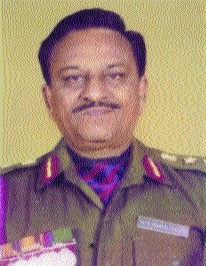Col Pimpalkhute: ‘Artillery Man’ of Bangladesh Liberation War
| Date :09-Jan-2022 |

Colonel Manohar Pimpalkhute (retd)
By Kshitij Udar :
Listening from a brave soldier about his experiences of war always gives an exhilarating feeling. Colonel Manohar Ramchandra Pimpalkhute (retd), the ‘Artillery Man’ of Bangladesh Liberation War, has so much to share from those days in life that a soldier actually lives for, fighting for his Motherland. Col Pimpalkhute hails from Nagpur. He started his journey with the Indian Army on May 3, 1964. Commissioned as Second Lieutenant at the age of 27 years, Col Pimpalkhute got his first posting with 19 Heavy Artillery which was converted into 19 Air Defence Regiment the same year based in New Delhi. He served the nation for 28 years and was posted at 10 different places across India. He participated in two wars against Pakistan and feels proud that he was a part of glorious victories in 1965 and 1971. Sharing his experience of the 1971 war, Col Pimpalkhute said, “The 1971 war was something which no one will forget. On the battlefield I have witnessed many ups and downs. I was posted as Instructor Gunnery in School of Artillery, Deolali when the Chief of Army Staff Field Marshal Sam Manekshaw issued an order regarding war with Pakistan for separation of Bangladesh.
As I was with the Army Air Defence I was asked to report at Jhansi.” “However, when I reached the railway station, I was told to move to another location named Moga. The problem was it was too difficult to find where the regiment was. During our training, we were trained and told that in such a situations a telephone cable on the ground will take you to your location and same happened with me in Moga. I reached the headquarters which was a transit camp and from there I was taken to a regiment that was 50 Air Defence in the Western Sector,” Colonel recalls. “I was assigned the task to give air defence to combat group. The group consisted of 60th Army Regiment with tanks and Garhwal Rifles. I got a vehicle with four guns mounted on it and a battery,” he added. In a lighter vein, he goes on to point out at a common mistake our movies often make showing tanks moving during day time. On the contrary, the movement of tanks is always during night hours, he informed. Col Pimpalkhute’s job was not as easy as it seemed. During night, his job was to trace the locations of the deployed tanks and give protection to them by putting his guns accordingly. He used to make a pit to stay protected. This would take a whole night of arduous efforts. He had to go with the soldiers to the next position and spend many nights without sleep.
Continuing with his recollection of those days, Colonel elaborated that as per the plan, engineers were told to build a bridge over the ethical canal within 6 hours so that the tanks could cross and settle on ground before sunrise. “Our engineers did a great job by constructing the bridge within the stipulated time. Because of their efforts it was possible for the Indian Army to deploy the tanks overnight,” he mentioned. “The critical nature of the job was to put my deployment before the enemy attack so that the air attack by Pakistan side may not affect the deployed Indian tanks. The crossing was too difficult for me because the fore vehicle on which the guns were mounted were of the Second World War and not very reliable. But we still managed to cross the bridge and reach our location. Our company was all set to enter Pakistan, but it didn’t happen,” he said. Though the war was for Bangladesh but the action was visible in western sector because of Pakistan’s position there.
“The war continued for 13 days and finally India registered a grand victory. It was the biggest victory in the history of wars as 93,000 Pakistan soldiers laid down their arms in front of Indian Forces. All the three Forces jointly made this happen in a well-planned manner. There were casualties on both sides but a soldier lives to die for his nation. This 1971 victory will always remain fresh in the hearts and minds of every soldier who was part of it,” Col Pimpalkhute says with a smile. Colonel Manohar Pimpalkhute retired on January 31, 1990 from the Indian Army and is now living a peaceful and happy life with family in Nagpur.